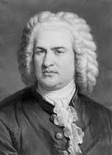

Winter 2014 Offering
Power and Majesty in Music:
The Cantatas of J.S. Bach, Part I
(Twelve weeks beginning on January 22/23)


Handel
Vivaldi
Having surveyed the complete operas and oratorios of G. F. Handel in recent courses, Opera con Brio will examine the comparable works of Handel’s great contemporary, J. S. Bach, his unmatched sacred and secular cantatas. The course will demonstrate how in Bach’s hands, the genre of the cantata, already a lyric and even dramatic counterpoint to opera and oratorio, became not only a high point in 18th century Protestant Germany, but had no rival among Baroque composers for daring and power on every level.
Mezzo Pamela Dellal of Emmanuel Music, which has been performing Bach cantatas for over forty years, eloquently expands on Bach’s stunning achievement in this genre:
The cantata in Bach’s hands morphed from being a work of devotion to being a work of penetrating psychological exploration; every emotion is laid bare and dissected, and the painful paradoxes of being human, desiring the Good but falling into temptation, fear and sin, are brought to vivid life by Bach’s music. Every musical device available to an 18th century composer is put into service, and Bach invents countless new ones in order to startle his listeners into engagement with the subject. The complexity, ambition, and harmonic daring of the greatest Bach cantatas have absolutely no rival among Baroque composers.
The course will thus trace the development of Bach’s some 200 sacred and 16 secular cantatas (including even an occasional miniature opera buffa), to demonstrate the richness of Bach’s extraordinary musical imagination and penetrating union of words and music. It will demonstrate as well that none of these works is any less masterful than the two more familiar and monumental extended narrative cantatas, the St. Matthew Passion and the B minor Mass, to be included also as the culmination of this extensive survey.
Come join us for a musical journey of unprecedented beauty, brilliance and power.
J.S. Bach
